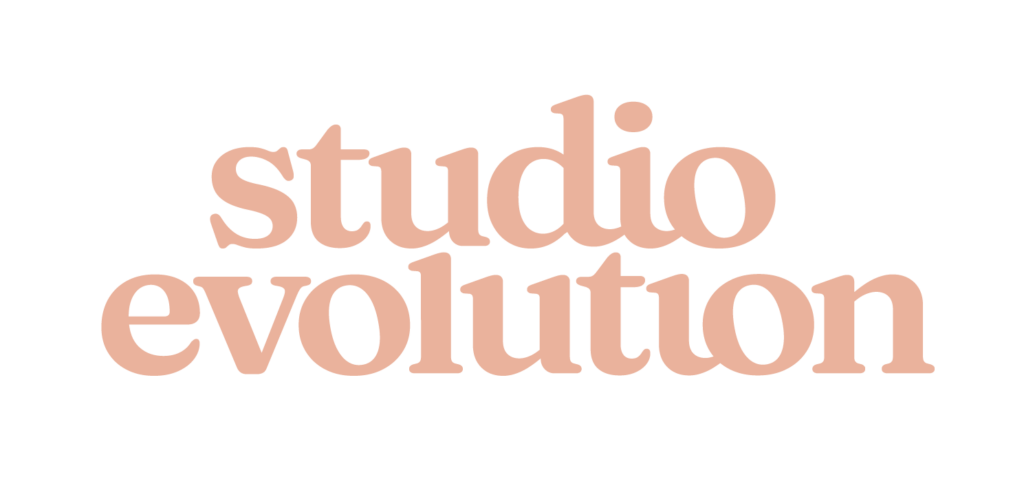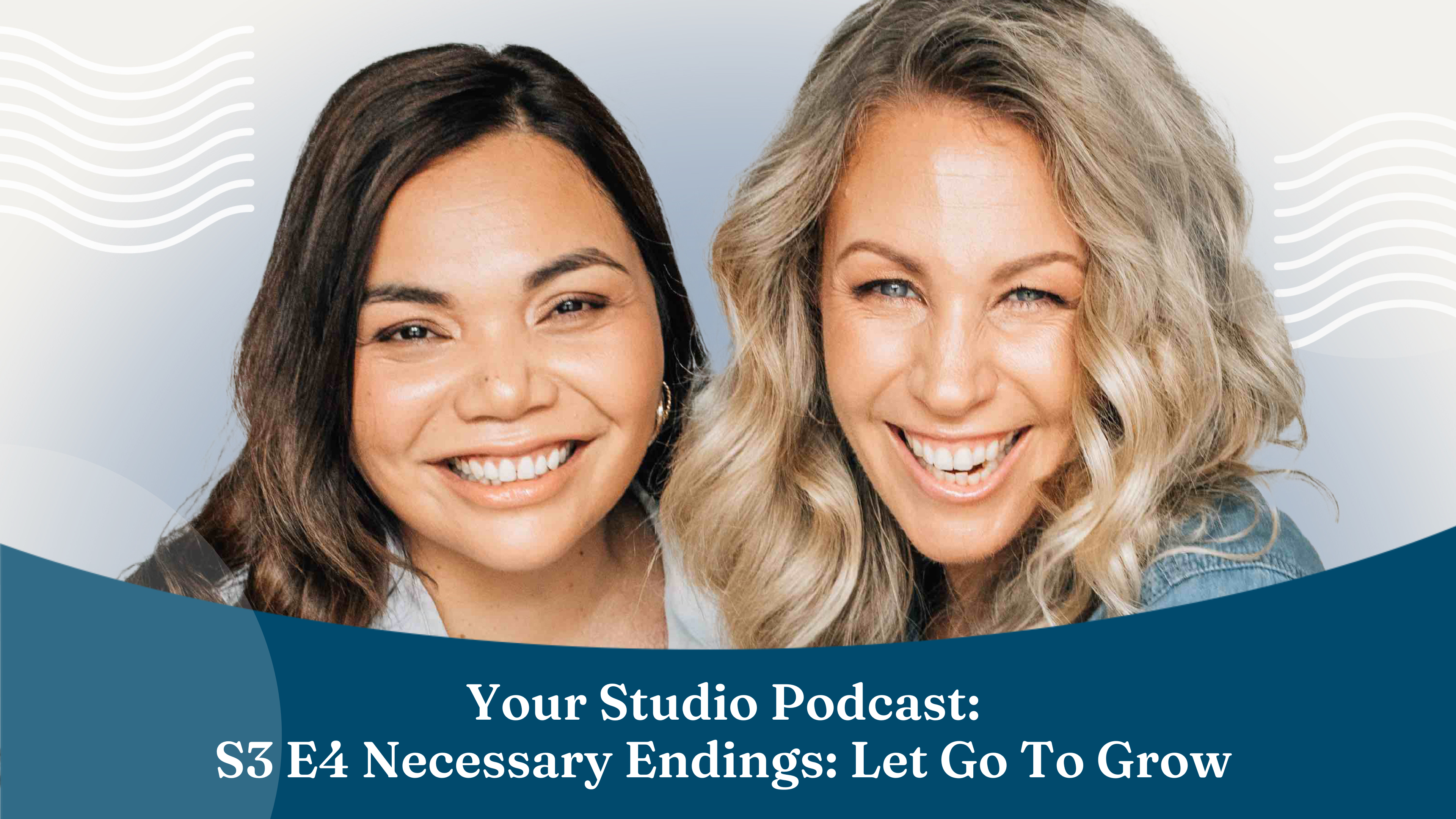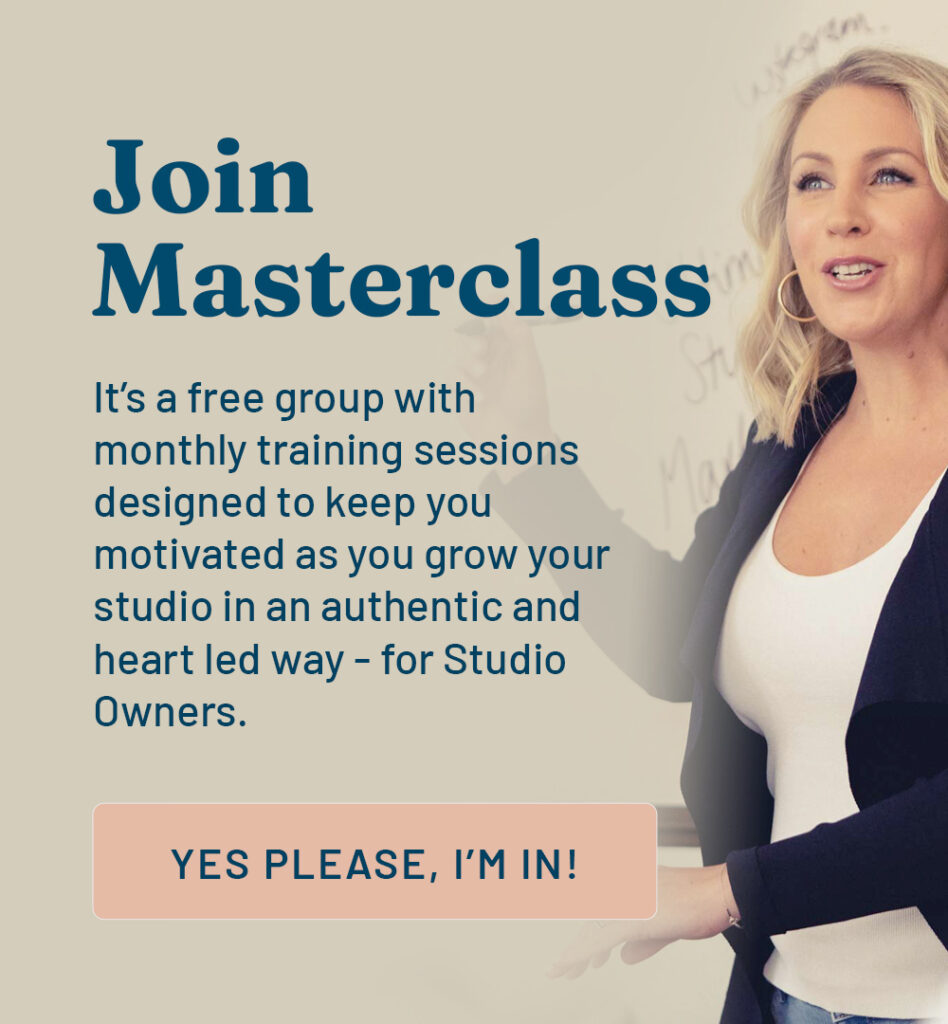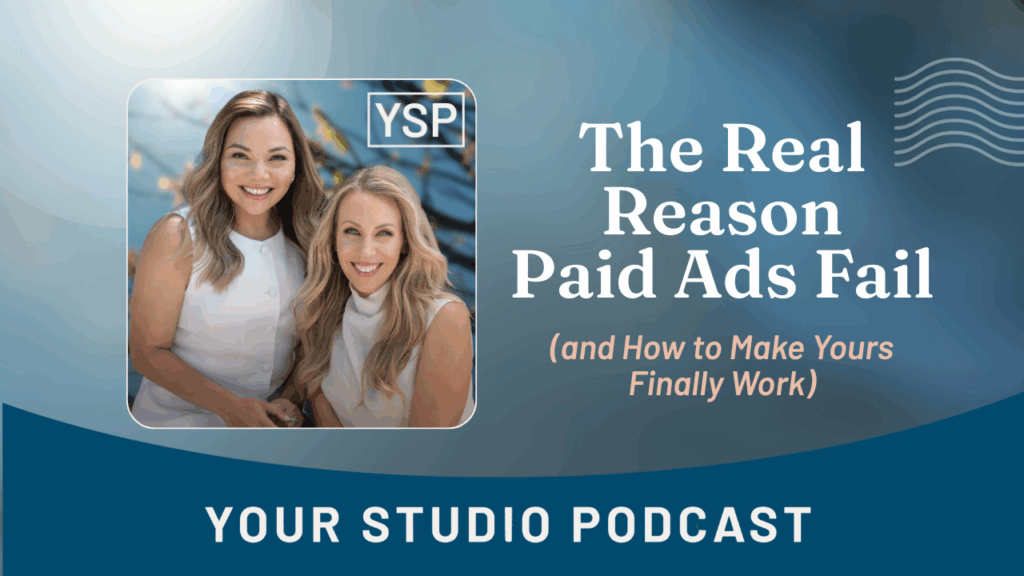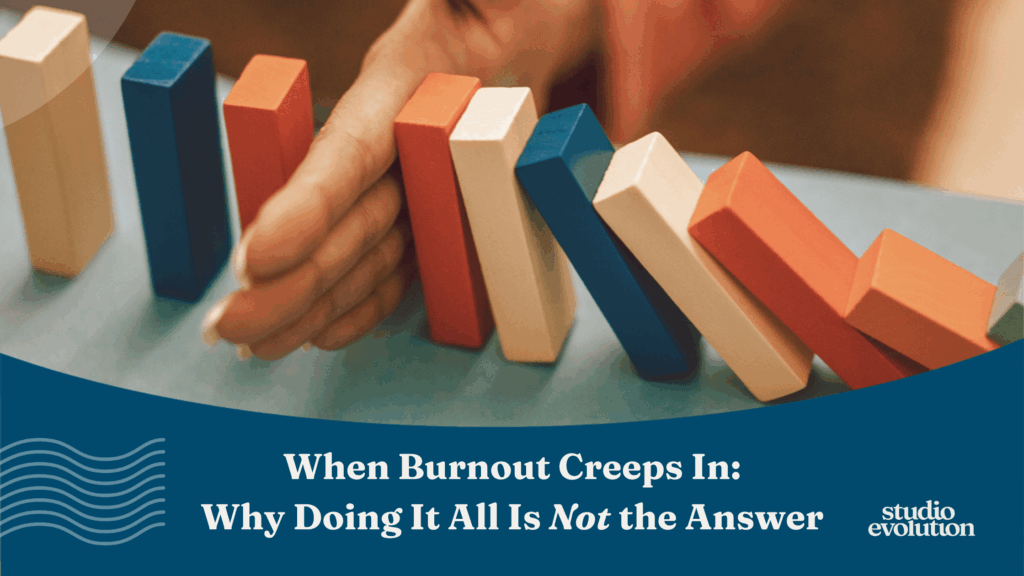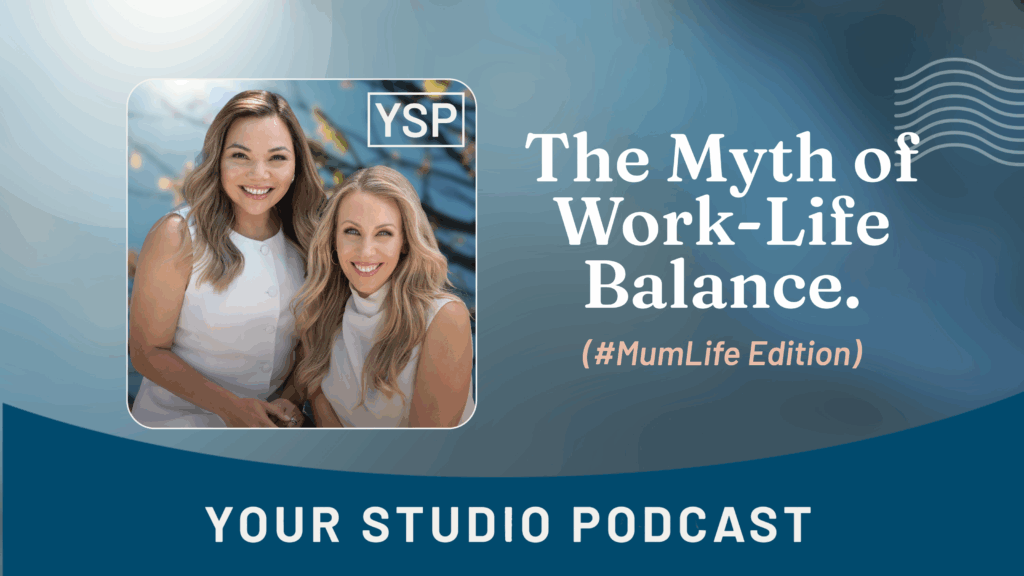Before something beautiful can bloom, something else often needs to end – and that’s where this episode begins. Chantelle and Michelle open up about the messy, magical process of letting go, inspired by the book Necessary Endings by Dr. Henry Cloud.
Whether you’re facing changes in your team, your business model, or even your own inner expectations, this conversation invites you to reflect, reframe, and reclaim your next season of growth with intention.
Munchkins, metaphors, and meaningful change – this episode is packed with giggles and golden strategy. And yes… you really do need to see the Munchkin moment.
Please make sure to subscribe and review if you like what you hear!
If you’ve got a studio problem you’d like us to solve, leave us a voicemail here: https://www.speakpipe.com/LeaveEvolutionAVoicemail
Be sure to follow us for more content perfect for Studio Owners!
Instagram: @thestudioevolution
YouTube: @thestudioevolution
Facebook: @TheStudioEvolution
And if you’d like some more support, find out how we could help you here:
Website: studioevolution.com/start
Transcript:
Chantelle Bruinsma (00:48)
I’m feeling like I’m much taller than you. Can we tilt your camera down?
Michelle Hunter (00:50)
Yes, I feel…
Yep, I’m just… There we go. Now we’re even!
Chantelle Bruinsma (00:54)
Just get, yeah. Now we’re kind of, I
was feeling like you a bit, a little munchkin you there.
Michelle Hunter (01:05)
trying to think of that frickin’ song you made me sing at that retreat. Did I tell you, I watched Wizard of Oz with the kids and then I saw the song and then Mitch is like, this is the song that you sang at retreat. I was like, And I was really trying to block it out and Tilly’s like, what song Mum? And I was like shush.
Chantelle Bruinsma (01:07)
gosh, you’re
And I can’t quite remember that, was traumatic and I blocked it from my.
Do you know that’s still Nic’s favorite ever memory of you? We talked about the other day. That is her favourite.
Michelle Hunter (01:25)
And I fuck every time she brings it up.
Every time she, like, I love you, Nic, but every time you bring it up, I want to punch you in the face.
Chantelle Bruinsma (01:33)
you
We’ll never quite let that go, honey. And the reason she, do know the reason she actually likes that about you? Do you know why? It’s because she knew how much you hated it.
Michelle Hunter (01:37)
No.
No.
Chantelle Bruinsma (01:47)
That’s what she likes about the whole thing she says.
Not the fact you’re a munchkin or a singing a song, cause she could see.
Michelle Hunter (01:52)
If you really think about that,
if you really think about that, let’s just go back to that.
Chantelle Bruinsma (01:59)
Yeah, we’ll tell the story.
Michelle Hunter (02:00)
So imagine,
imagine that, you know, at the online global retreats where Chantelle’s teaching really high level strategy with all your, you know, private clients. And that is the week typically when the general manager is fixing all the back end. So prepping for launch, doing all the financials, really like making sure the systems, you know, in there. And then I was sitting on the couch one night having a bowl of ice cream with ice magic. I remember it so well.
Chantelle Bruinsma (02:20)
Working hard.
Michelle Hunter (02:29)
got a Voxer from Chantelle. I’m like, what the hell is she doing up at night? She’s going to be presenting in like 11 hours. And she’s like, uh huh, hi wifey. You’re going to kill me. That’s how you started. And I was like, oh. And Mitch was sitting next to me on the couch and he knew it was business. Cause I got up, I was like nervous. I had to nervous poo already. I like, what’s going on? What’s going on? And then she said, she’s like, Oh, I’ve got a huge favor. I was like, yeah. Could you, and then you were laughing through the Voxer as you asked me. So then I knew.
Chantelle Bruinsma (02:36)
You
I believe I did that.
Thanks
Michelle Hunter (02:56)
I was like, oh, this is going to really test the friendship. You’re like, are you laughing already? You haven’t even told me what you’re going to ask me to do. And she’s like, oh, you know, the Wizard of Oz anyway, we’re singing a song. I was like, of course you are. Why wouldn’t you be singing a song at retreat? And she’s like, oh, and we just need you to do a little bit. And it would also, we thought it would also be really good if you would dress up as a munchkin.
Chantelle Bruinsma (03:16)
Hmm
Michelle Hunter (03:21)
Then you sent me the song, then you sent me a photo of a munchkin which looked like an 80 year old shrunken old guy. was like, what the? And then, know what I did for the next two hours, I was raiding me and Mitchell’s wardrobe for something that looked like a munchkin. And I was drawing with an eyeliner pen all over my face, trying to recreate a fake beard. And then what happened?
The next morning at like 6.30 AM, I’m dressed as a munchkin. My kids are eating their cereal so confused at the breakfast bar. Mitchell is just in delight, just like laughing his head off. I’ll do the morning run this morning. I’m like, now you’re up and about. Now you’re up and about. Now you want to help. And then I just walked in and then like no prep. And I had to sing a munchkin song.
Chantelle Bruinsma (04:07)
lyrics with like
Michelle Hunter (04:10)
Memorized lyrics? Look how much you’re laughing because you knew…
Chantelle Bruinsma (04:11)
No.
most horrible friend in the world.
Michelle Hunter (04:17)
You were like, and then you know what it is when you’re singing. That’s fair enough. Like if we were at retreat in person, it is dead silent on a zoom online global. There’s no response. I can just see your camera and Nic’s camera like dying and, then, and then just all the members going, and then you came in and finished the song and then it made sense. The, teaching moment you brought into.
Chantelle Bruinsma (04:41)
Can we actually
find the actual recording of that? was nurturing attraction. I hate your guts. Retreat, Holly.
Michelle Hunter (04:44)
Stop! Can you stop it?
I’m sure Nic just has it as her screensaver. So just ask Nic.
Chantelle Bruinsma (04:52)
Day two or
I’d really like to see it. Overuled, sorry.
Michelle Hunter (04:53)
really don’t want to relive this.
Chantelle Bruinsma (05:48)
I’m so sorry.
The things I put you through, I mean, and the worst thing is I knew it was funny.
Michelle Hunter (05:57)
Well there’s no shame, they all know about my pooping and then now they just know about the most embarrassing point of my life. So we’re good. It’s okay. I’d probably say one of them. Yeah, cause I’m quite, I really normally don’t care what people think, cause I think it was just so uncomfortable.
Chantelle Bruinsma (06:03)
Sweetheart, was that really the most embarrassing moment of your life?
Really?
I
think also like you didn’t have a lot of time to emotionally prepare. It was very brief.
Michelle Hunter (06:19)
No.
Chantelle Bruinsma (06:21)
What about you? you know, my most embarrassing studio related. Remember? You know, my, this is a horrible story. This is a horrible story. So we’re in Hawaii running a high level retreat. Yeah. You know, it’s really horrible. This is a terrible story. Anyway, so we’ve got clients and they’re high level clients and we’re in Waikiki.
Michelle Hunter (06:20)
about you? What’s really, what’s your name?
Chantelle Bruinsma (06:41)
running this lovely event. And on the last day, were kind of doing some, you know, kind of high level interview work. So I’ve got one of the clients there and her husband was filming me interview this client. So he’s there filming us and I’m there talking happily to this lovely client. And then suddenly I just see his kind of face just go like, like uncomfortable and just like, I’m just in the zone doing my thing. And then it keeps kind of.
And then afterwards, he tells me that, so my husband was on another Hawaiian island at the time and missing me and sending, he was sexting me these sexy messages and they kept popping up on my phone whilst, whilst, and he couldn’t stop them.
Michelle Hunter (07:26)
Hi, dear client’s husband was recording.
there’s another.
Chantelle Bruinsma (07:39)
my God, this poor man, this poor man, I was mortified.
Michelle Hunter (07:42)
my gosh, that was so funny. When you
told me. my gosh. No.
Chantelle Bruinsma (07:46)
There’s no recovering from that. Like, there’s
no recovering.
Michelle Hunter (07:51)
That is hilarious. That’s like the fun. And then what was your, when you like, cause then you opened your phone, right?
Chantelle Bruinsma (07:55)
Died. Actually
died. Actually died.
Michelle Hunter (08:05)
I was such an intimate group. my gosh. I remember that when you got, my gosh.
Chantelle Bruinsma (08:11)
I apologized. And now I don’t actually do this for you, Holly, because like sometimes like, you know, team takes my phone. You must put do not disturb on so that they don’t. Yeah. Apologies, Holly. is, this is, this is, this is the advance.
Michelle Hunter (08:12)
No!
Look
Warning.
Chantelle Bruinsma (08:31)
You know it’s a good chat when I’ve had to blow my nose twice from crying.
Michelle Hunter (08:34)
I’ll just mark because we’ve been chatting for a ridiculous 37 minutes. Hello everybody. And welcome back to the your studio podcast. It is Michelle Hunter here and Chantelle Bruinsma. And today we have a whopper to dive into. Don’t we Chantelle? Yeah.
Chantelle Bruinsma (08:37)
37 minutes.
Whopper, good
old whopper. And this is probably one of the most interesting and most difficult concepts to really adhere to, I think as a business owner and even in life as a human, to be honest, we’re to be talking today about the idea of pruning. Welcome to your gardening podcast. It’s going to be a lot of, With Chantelle and Michelle. Now Michelle has concreted extra sections of her garden.
Michelle Hunter (09:02)
Mm.
Which I tell Michelle.
Yeah,
to purposely not mow the lawn. But I want to. I want to be the pruner.
Chantelle Bruinsma (09:22)
Well, your dream is to be a homesteader, right? You do have aspirations for the growth side. It’s not this stage of life. You’ve got too many children. You’ve got too many children, too many responsibilities. Too many nappies.
Michelle Hunter (09:26)
the dream and to pickle. Just not this stage. Too many children, too many nappies right now, but
one day I’m gonna get to the garden.
Chantelle Bruinsma (09:37)
So in a garden, you know, it requires a lot of pruning, right? And maintenance and weeding and all those things. But lovely Michelle Schaper on our team sent me like a little recommendation for a book. And this book is called, Necessary Endings, the Employees, Businesses and Relationships that All of Us Have to Give Up in Order to Move Forward by Dr. Henry Cloud. And that’s what we want to kind of talk about today, this idea of
Michelle Hunter (09:54)
Mmm.
Chantelle Bruinsma (10:07)
what has to end in order for the new era to begin. It’s like, got you here will not get you there. And there’s a lot of things we’re gonna talk about in that. So, but I we might just begin. I’m gonna read a little excerpt from this book by Dr. Henry Cloud. So pruning is a process of proactive endings. It turns out that a rose bush, like many other plants, cannot reach its full potential without a very systematic process of pruning.
The gardener intentionally and purposefully cuts off branches and buds that fall into any of three categories. Number one, healthy buds or branches that are not the best ones. Number two, sick branches that are not going to get well. And number three is the dead branches that are taking up space needed for the healthy ones to thrive. Pruning enables rose bushes and other plants to realise full potential.
Without it, they are just average at best and far less than they were designed to be. If you think about it, there Chantelle never be an average rosebush. By nature, there’s nothing average about them at all. They are designed for incredible beauty and lushness, but if not adequately pruned, they never make it. And like rosebushes, your business and your life also need the three types of pruning to be all that you desire.
Michelle Hunter (11:26)
Well I think we’ve all had a not so glorious Rose Bush. Once upon a time.
No, that’s probably not the one.
Chantelle Bruinsma (11:39)
We’ve actually just spent the morning talking already about pubic hair. this has already gone in a bad direction. But nonetheless, it’s like, you’ve got to prune these things.
Michelle Hunter (11:46)
So,
you gotta prune, you gotta prune.
Chantelle Bruinsma (11:52)
Bit of landscaping.
Bit of landscaping, friends.
Michelle Hunter (11:59)
my goodness, if only they knew the 40 minutes before this of chatting.
Chantelle Bruinsma (12:01)
God.
So funny,
so funny. So, I mean, I like those three categories. Number one, ones that are good, but like not their best. Number two, ones that are sick. And then number three, ones that are taking up space for someone else to kind of come through. And, you know, I know for myself, like running a business and then, you know, some things kind of run their course, right? And if you hold onto things for too long, sometimes it doesn’t allow you to see what really is possible.
Michelle Hunter (12:11)
Mm.
Chantelle Bruinsma (12:32)
It’s tricky, tricky, right?
Michelle Hunter (12:33)
Yeah.
It’s really tricky. And I think that there can be a very like relational connection as well with, with pruning and I’ve seen, and I even know for myself, like this is just in a personal relationship. had, you know, someone in me and my husband’s life at the time and their input of trying to kind of infiltrate our relationship and our circle was really detrimental to our marriage and our relationship. And it wasn’t until I pruned that whole connection.
away, like that toxic energy kind of moved and, and we were able to flourish in a new way. And what I see and I Chantelle what we see a lot is this happens a lot in the studio owner world as well. You know, there’s a few situations and circles when you’re a studio owner and you have a lot of people that you rely on and you trust on, but sometimes those relationships are no longer positively contributing to the business.
Chantelle Bruinsma (13:14)
Mm.
Oof, and they’re the ones that keep you up at night. You’re thinking about the conversations you’ve had or what you could have said better or that you have a final word in or how you’re gonna connect with them in the future and trying to come to an even point in the relationship. It’s like those team members where you just kind of like, get on board and everything you kind of try and do with them, there’s just resistance. There’s just resistance. There’s hesitancy or they’ve got issues with it. There’s so much friction in the relationship.
There’s so much of your energy is going to just trying to get them on the bus. And it’s the decision of like, are they the right people on the bus in the first place?
Michelle Hunter (14:00)
Yeah.
Do you think Chantelle there’s a relation or, you know, or a pattern because as studio owners, sometimes those people that we bring on in those situations and we’re like over-investing time into, is it because like we’ve brought them up through the studio or we kind of feel that we’ve been in a mentoring role with them? I see that this is a, this is a piece that’s really hard for some studio owners to let go. in particular with their team, if, it the mindset that they’ve invested so much? Cause we know so many studio owners that are just.
Chantelle Bruinsma (14:26)
Mm.
Michelle Hunter (14:36)
so good at that, investing in their team and mentoring them, but just having to prune that branch because it’s you’re spending so much time on it instead of, you know, back into the business. Why do we find that so difficult?
Chantelle Bruinsma (14:52)
That’s a really good question. wonder if it’s like, you know, as teachers, we are really good at seeing potential in people. Like we can take some, we can take a student and they’re here and we know how to kind of get them to here. You can lead a horse to water, but you can’t make them drink, right? So I think with team, there is definitely a degree of we believe in them and we can see what this person could be, but there’s got to come a point of like, again, if that team member is
kind of icky or toxic, then it’s going to flow over to the other team members and impact on the culture. So it’s that decision of knowing when, when’s that point of trying, when do we get to the end of trying?
Michelle Hunter (15:37)
Yeah, that would be a great measure because as you said, the flip side of that is it, it’s, it spreads and we’ve seen it. And instead of pruning one branch, you’ve got, you know, you know, when they say when, when, when your plants go bad or the bush goes bad, right. And then it infects all the other branches. That’s the flip side of the situation. When you leave it too late and you prune that they, they, there seems to be a follow on effect.
Chantelle Bruinsma (15:52)
Yeah. Yeah.
And it’s even like, it’s like that category number one, it’s like their health, there’s, might be even kind of things that are okay, but they’re, they’re not the best. And, you know, even looking at this from a different angle, like programs in the studio, programs in the business, you know, you might have a bunch of different programs you’re running and there’s probably one program in your business right now that you’re just struggling to get it to capacity. And it just always feels like something that you’ve got to work really hard on to try and get the marketing happening, to get the retention happening.
Like, that little program on Thursday afternoons, like, I just can’t quite get it. And how much of your energy is going into trying to fix what’s not working? And like, there is a real school of thought that we do with our clients in in the, in the purple pillar, the Elegant Ease pillar. And it is kind of really reviewing of like, if I didn’t have this program, how much more energy and consolidation I could put into the other programs. Like the Rosebush cannot be what it’s.
meant to be if it’s carrying the dead weight and sometimes you’ve got to do a bit of get your secateurs out.
Michelle Hunter (17:00)
Yeah.
Yeah. And, and,
and I think that’s, there’s more courage when you don’t feel so alone or in isolation when you do that as a studio owner, isn’t it Chantelle? When you’re kind of in a community, it, it, it, it’s a bit easier because you’ve got other studio owners or people to bounce off who have probably been in those similar situations, but it can be really scary when you’re a solo studio owner and you have to make those big decisions.
Chantelle Bruinsma (17:24)
And I don’t think you do. I think when you’re on your own, just kind of soldier on. It’s like, you just keep that team member there who’s great, good, but not great. You just keep the programs that are kind of not really performing very well. There’s this, things just kind of grow and continue to expand. It’s someone asks, could you please run this kind of program? We’d love to do this kind of genre. You’re yeah, sure, we can do that. And so you add it on and you kind of then your program suite
Michelle Hunter (17:27)
Yeah.
So true. Yep.
Yeah.
Chantelle Bruinsma (17:51)
kind of grows, your timetabling complexity grows. You’re like, yeah, yeah, we can do that. And there’s an adding versus what we’ve seen is that the more pruned your business model, the more really refined your team, the more growth you can see. And so this is an exercise in like, what can we lovingly, kindly, but very strategically consolidate in the business? And yeah, but the relationship ones are the hardest to do, right, Michelle?
Michelle Hunter (18:17)
They’re so much, they’re definitely the hardest ones. But in saying that once you do it, your threshold actually become, you become better at it and you actually recognize the red flags. And, and once you’ve gone through the hard pruning once you’re so much on top of it, you’re, you kind of see it and you’re like, no, I’m putting that boundary down and it doesn’t even get to that situation the second or the third time.
Chantelle Bruinsma (18:26)
Yeah.
I mean,
it feels to me, Michelle, like what you’re saying as you get, build the muscles in it. It’s like, are you comfortable disappointing people? Can you get, cause really what this is, is kind of playing with people’s expectations of you. You know, if you’ve got a team member who is just not on the bus and they’re good, but they’re sure as hell not great. And there’s a lot of energy going into maintaining this part of the rose bush that’s not really thriving.
Michelle Hunter (18:46)
Completely.
you
Chantelle Bruinsma (19:08)
And you keep, I’ll just do more, I’ll just do better, I’ll just kind of try it a different way, I’ll try it this way, what if I do this kind of mentoring, what if I give them this pay rise, what if I kind of give them this flexibility, what if I kind of do this like this, all of this kind of people pleasing to try and get them there. I’ll do this marketing to fill that program, I’ll do this kind of thing, I’ll do this incentive, I’ll do this, I’ll put this teacher, I’ll teach the class myself, I’ll kind of do whatever I’ve got to do. It’s like you will stretch yourself and turn yourself inside out to be the fertilizer to kind of grow the rose bush versus just going.
Michelle Hunter (19:24)
Yeah.
Chantelle Bruinsma (19:38)
I’m okay with letting people’s expectations be not met because I know what’s great for the whole is for this to happen. And it’s coming to that place of worth within ourself. It’s okay that we make mistakes. It’s okay that we change directions. It’s okay that we do things differently. But if we keep on doing and letting things just kind of continue to not thrive, what is that saying, right?
Michelle Hunter (20:00)
Hmm.
And it’s, it’s, you’re bang on. And it’s like muscle memory. You’ve got to be, you’ve just got to be okay with it. And it takes time. No one’s, we’re not there instantly. We’ve done a lot of work to get there. With people, you know, where we stand, it’s like, understand, you know, it’s a language. I understand you’re disappointed and I cannot, you know, and I understand that’s what you want, but we’re not willing to meet that in this situation. It’s really.
Chantelle Bruinsma (20:07)
Mmm.
Ayo.
Yeah.
Michelle Hunter (20:27)
practicing that in your language and feeling okay with it. And it’s going to feel uncomfortable to start with, but just getting used to it.
Chantelle Bruinsma (20:36)
So we can prune, there’s like the three categories, right? Things that are healthy but not the best. So it’s like what in your business right now is doing okay, but it’s not, definitely not thriving. It’s a good thing to think about, Like it could be a system, it could be a team member, it could be a program, it could be a location.
Michelle Hunter (20:58)
Yeah. And that doesn’t necessarily, I think, always stand out. I think like that one, it’s like when you become better at pruning, I think the first one is like when you get better at pruning, you’ll find those quite easily and be like, yeah, that’s not being used. Yeah.
Chantelle Bruinsma (21:05)
Yeah.
Number one’s totally the hardest, you’re right. That’s the
hardest one because like it’s okay. And so like there’s that tolerating like, well, it’s fine. There’s nothing wrong with it. Yeah, it’s okay.
Michelle Hunter (21:20)
You would totally write it. Yeah.
Chantelle Bruinsma (21:22)
that whole concept of they’re doing well, but it’s what could be, what could life be like if we didn’t do that? Yeah. If we didn’t have this program.
Michelle Hunter (21:32)
and knowing when
to call it early.
Chantelle Bruinsma (21:35)
Mmm.
Michelle Hunter (21:37)
You still have hope.
Chantelle Bruinsma (21:39)
isn’t that the truth? Isn’t that the truth?
Michelle Hunter (21:41)
like, know, it’s
like, we’ll just give it some more time. I’ll have some more energy. I’m just gonna get over this little bump. I’m gonna have more energy to invest in that program. She’s just going through a bit. I know she’s not invested in this in that lesson right now, but just give us some time.
Chantelle Bruinsma (21:55)
I think the place that you and I have come to as business owners recently, can I put that as a little add in, is that kind of whole thing of like, the earlier we have the hard conversations, the better it is for everyone. It’s like, I’m not feeling comfortable in this situation. And as a business owner, we’re not feeling comfortable in this dynamic. Here’s why, can you let us know how you feel about it? The earlier we have those conversations, God damn, it’s made a difference, right? Yeah.
Michelle Hunter (22:10)
Yeah.
It’s been life changing in the business
completely. And the longer you leave it, it’s not going to, from our experience, it’s not going to change. If there’s a bit of a crunchiness in there, it’s got to be brought up super early.
Chantelle Bruinsma (22:29)
Yeah, crunchiness gets crunchier. It’s like stale bread. It’s just gonna get staler.
Michelle Hunter (22:31)
Yep. Yeah. Just kiss. Yeah.
It’s gonna eventually be a rock. That’s gonna.
Chantelle Bruinsma (22:40)
I was talking to a friend about these the other day because she’s just recently stepped into a leadership position and she’s got, she’s finding there’s a lot to learn about being a manager. And I told her about the book Dare To Lead by Brene Brown. And in it, she has this concept of rumble starters and what Brene Brown calls, if you haven’t heard of Brene Brown, she’s like one of the best experts and academic on leadership in the world, but she makes these like lofty, know, academic concepts really relatable and practical that you can use. And there’s a book called Dare To Lead and in it,
Michelle Hunter (22:47)
Mm.
Chantelle Bruinsma (23:09)
these rumble starters like openings, how to open a hard conversation. So when you’re having one of these kind of pruning conversations, you open it with like, I’ve noticed this, can you tell me more about it? How, like I’m feeling a lot of resistance from you in this area. Can you, can you share how you feel about that? It’s, I’m uncomfortable with this. And it gives you this list of ways to start sentences to open up hard conversations. And it’s one of the most practical things that we do, right? We actually bring in a Brene Brown.
Michelle Hunter (23:34)
Yeah, so good.
Chantelle Bruinsma (23:38)
expert to our leadership retreat to kind of train our clients from Studio Evolution on this topic because if you don’t have these tools right Michelle you just avoid them you just feel like and then you get run over.
Michelle Hunter (23:39)
Yeah.
Completely. And it’s really interesting when we have that facilitator come in, she actually brings a few studio owners on and she gets one to act like the staff member or the difficult parent. And then, you know, she explains how to use these rumble starters and we actually do a simulation and it’s incredibly confronting in the moment. Cause could you imagine having to, you know, to do that, but also it’s also very calm. Like everyone’s like, my goodness. I’ve been in that situation that exact same.
Chantelle Bruinsma (24:01)
Oof.
Michelle Hunter (24:19)
situation and if I just had like a little bit of help or a bit of a guide to how to do it, it’s again, it’s like building that muscle memory.
Chantelle Bruinsma (24:26)
I mean, there’s a part of me right now we could do a demo Michelle, but is this gonna take it too long.
Michelle Hunter (24:31)
Okay.
No, not at all. No, because 35 minutes of this, we were laughing. I’ll be the, I’ll be the difficult. Just getting some payback on some munchkin time. Okay.
Chantelle Bruinsma (24:33)
No, you reckon this is good? Well, I’m happy, can do… Faffing.
Yeah, I thought you might.
Munchkin time. Yeah, fair. All right. So
what we want to actually we’ll just talk about this like we actually might do a little demo of how to have a hard conversation and Michelle is graciously going to be the difficult team member, aren’t you? yeah, the top one. All right. So what’s the context? What what are you kind of what are we finding here? What’s our situation?
Michelle Hunter (24:57)
Ha!
Yes. It’s going to be a stretch.
Okay, let’s talk about perhaps some flex in my work schedule. Let’s talk about that.
Chantelle Bruinsma (25:12)
Okay, and so what I’m noticing is that there’s too much flex.
Michelle Hunter (25:15)
That’s too much flex, yep.
Chantelle Bruinsma (25:16)
Okay, let me think of just some, so let’s some examples. and I’ve been noticing this is happening for quite a while now. Okay, and so I’m calling this, you don’t know what I’m gonna bring to you?
Okay.
Okay, I’m gonna take a deep breath because these are not easy conversations.
Michelle Hunter (25:28)
They’re not, I’m like, I’m also feeling nervous and I’m
the person being rumbled. this is…
Chantelle Bruinsma (25:35)
Everyone listening, did not plan to do this. We are totally on the fly. All right. What’s your name?
Michelle Hunter (25:37)
No, no, this is how on the fly. Okay.
This is fun, I get to pick a name. Helena, that’s what I was always, I was gonna be called. So let’s go with Helena. Yes. Are you Chantelle? Okay.
Chantelle Bruinsma (25:47)
Yeah.
Helena, hello, okay. No,
my name is Jenny. that’s a Jenny. Okay, hi Helena, how are you?
Michelle Hunter (25:59)
Okay.
I’m good. Thank you, Jenny. Thank you. just thank you for making the appointment a bit later. I just had to have a yoga class I really wanted to attend this morning.
Chantelle Bruinsma (26:11)
Yeah, I understand. Well, I’m really grateful with this time to be able to connect with you. How have you been going in your role recently?
Michelle Hunter (26:19)
Yeah, good. I’ve been feeling pretty, pretty good. Pretty on top of everything, I guess. It’s been, yeah, it’s been quite relaxed, actually, I’ve been feeling quite good.
Chantelle Bruinsma (26:32)
That’s good to hear. You know, we’ve been getting some lovely feedbacks from some families and that, you know, your classes are really connecting and yeah, I’m really so thrilled to hear that. What I wanted to talk to you is about one little part of your job. If that’s, if we’ve got some time to be able to do this. So what I’m noticing at the moment is that when it comes to your availability, it is being quite…
Michelle Hunter (26:59)
Mm-hmm.
Chantelle Bruinsma (27:02)
prevalent that you’re needing to change your classes and having covers for your classes and there’s a lot of kind of rescheduling happening on a very, very consistent basis. And I wanted to explain to you why that’s really a tricky thing. One of the things that’s the most important foundation of this entire business is retention. And when the students are coming and the teacher is always changing, the students don’t have that
Michelle Hunter (27:03)
Hmm.
Okay.
Chantelle Bruinsma (27:30)
consistent experience that they can rely on and that relationship that they feel connected with. And if that’s changing all the time, then the teacher doesn’t have that attunement to how they’re progressing and like reminders like last week you couldn’t do this, next week you can. That’s so, so great. And so from a retention basis, really, it jeopardizes what this whole business relies on. And when also there’s like this flexing of your availability,
Michelle Hunter (27:33)
Mm.
Chantelle Bruinsma (27:59)
It also puts a lot of pressure on the other team members because they care about the studio and they don’t want classes to go empty. So there’s, there’s kind of a people trying to kind of have your back. And that’s actually a real testament to our team. It’s probably just happening to a degree that I’m not quite comfortable with in it being in alignment with what we care to deliver. So I was kind of just wanting to have this conversation with you to kind of see how you’re sitting with that and what your feelings are.
Michelle Hunter (28:26)
Yeah, well, I’m a bit shocked, to be honest, because I do take my, my, you know, role here as a teacher very seriously. But you also, you know, and I made that very clear in the interview process that I do also audition quite a bit. And, you know, there, there are other workshops, you know, that if they come, you know, into, into the, into the region where I have an opportunity to either judge or to lead.
that’s also really important to me as a performer and also to my personal development as well. But I do understand, you know, the retention aspect and the regularity for the students. But there’s also that aspect as well that I still have, you know, a performance career as well that I’m following.
Chantelle Bruinsma (29:15)
Okay, thank you for sharing that. So could you tell me a little bit more about how with what your expectations are of how much flexibility we should offer you in your role when you’ve got a role as a consistent kind of weekly teacher? What do you feel are the kind of the where’s the flex in that from your perspective?
Michelle Hunter (29:33)
Well,
that’s really, well, yeah, that’s really hard to pinpoint because you guys are regular. Like you are my regular time each week, but when auditions aren’t regular. So that’s probably the infrequency when things come through, that’s not regular. So I guess the, yeah, the flexibility is a bit ad hoc on the fly.
Chantelle Bruinsma (29:43)
Yeah.
Mm-hmm.
And look, respect, I understand that that you have this dream to be a performer. I totally understand that. And also I really have to be aware of the priorities of this business and the student experience. And retention is so, so very, very important to us. We really care about retention. And if this is a role that you aren’t able to be consistent in, then you know,
Michelle Hunter (30:09)
Yeah.
Chantelle Bruinsma (30:22)
I have to understand like you’ve got your dreams, right? You’ve got your aspirations and we’re not gonna stand in the way of that. And also we need to have consistency in our teaching team. So as a bit of a guideline, I would like to really state that what I’m comfortable with in terms of flexing is probably three classes flexed in a six month period. That’s the maximum. So a maximum of six a year. Now that’s still quite a lot, right? I think that that is being really generous.
we don’t have to give any flex, you know, and we can be much more kind of attuned to that. But I want to just really be in this situation having some consistency for you. Sorry so we can have some kind of compassion for your situation. So do you feel you’d be able to commit to no more than three flexing of kind of class swaps in a six month period?
Michelle Hunter (31:14)
Yeah, well, you guys are my bread and butter. you know, teaching your classes every week, you know, not always in main income, but I do love that. So yeah, I could definitely speak to my agent and if that’s, know, a three and a six month period, I can just ensure when others come in and well enough time, they can be in, times outside of my teaching hours.
Chantelle Bruinsma (31:23)
Mm-hmm.
Look, that would be wonderful. And we would so appreciate that because we so value what you bring to the classes. And again, our students really love you. They just want you there every week. And like, I know that we can’t always have that. And that being said, I’m really grateful for this conversation we’ve had to be able to get on the same page. let’s say down the line, like let’s say in the next six months, like you go to four flexes. What might happen then is that you and I can have another conversation to go, actually, this is more than what
I’m willing to flex on and this is what you’re wanting to do more of and we can have a conversation if this is still in alignment with what you want or if you do actually want to pursue, if you want more, to pursue more auditions and have more workshops, then maybe this is not the perfect fit for you at this stage of your life and that’s okay because I respect that’s what you’re going to do. Yeah, how does that sound?
Michelle Hunter (32:22)
Okay,
yeah, that sounds great. Thank you so much, Jenny.
Chantelle Bruinsma (32:25)
Welcome. Thanks, Helena
Michelle Hunter (32:29)
You’re good, Chantelle, I tried to push back on my career dreams of being a professional liturgical dancer!
Chantelle Bruinsma (32:30)
you
Well look, mean the truth is that people are gonna do what they’re gonna do. People have dreams. You can’t stand in their way.
Michelle Hunter (32:40)
It’s true, but you know, you did,
you know, you did so well there as well. It’s like you very clearly. Articulated what your expectation right. But you also did that. So it’s like, but if that’s not what you want, you’re free to go as well. And then I had to actually think, but no, you, your classes actually pay my rent. If I just let go and was auditioning, I would be living on nothing. And I still, you know, it’s yeah. Those rumbles are fantastic. And it’s yeah.
Chantelle Bruinsma (32:53)
Yeah.
You got to give them choices.
You got to help them feel that like you can do and you can be who you want to be. no one is obliged to work for you. No one is plenty of fish in the sea. If this doesn’t work for you, it’s okay, but you can’t force anyone here. And I don’t believe in kind of putting boundaries and, kind of like strong kind of cages around people. It’s like, well, no, if you, if it’s like, if someone’s coming to their role, but they’re not really showing up enough, if they’re kind of doing a good job, but like not a great job, have a conversation about it.
Michelle Hunter (33:16)
Yeah.
Yep. Yep.
Chantelle Bruinsma (33:36)
you know, maybe you want to drop them down to less hours or something, I give them choices, but like we’re saying we’re not comfortable with how this arrangement currently is feeling and we’re paying the wages. So if we’re not comfortable with the return of the investment, we have a conversation about it sooner rather than later.
Michelle Hunter (33:36)
Yeah.
Yep.
Exactly, exactly. That was great. So practical.
Chantelle Bruinsma (33:55)
Good
job, Michelle. I thought you were gonna push harder on me, actually. was like, she’s gonna bring it now.
Michelle Hunter (34:02)
I was going to, but you actually kind of like laid it out quite simply. Yeah, laid it out quite simply. So I didn’t feel I had to push more.
Chantelle Bruinsma (34:08)
Gosh, did one one time we did this at retreat and one of the clients was playing the difficult teacher and she just dug in and it was really tough. Remember that?
Michelle Hunter (34:16)
She dug, it was
really tough. All of us were sweating. All of us. It was, but that studio owner who handled it. I bet she handles rumbles so well now. It was my sister. And she was like, and she handles them quite well now.
Chantelle Bruinsma (34:20)
was uncomfortable conversation. That was a rumble.
Oh, it was, was, yeah, was Faye. Your Faye was the kind of demo one. She was, it
was like, it was like a 7.15 in the morning. And yeah, these, these conversations are not easy, but I think the more you kind of get to the place of like, this is who I am. This is how I feel. I’m allowed to feel this way. I can have this conversation kindly and kind of clearly and we’ll both feel better for it in the long run. It’s good. It’s good. So.
Michelle Hunter (34:37)
Yeah, yeah, yeah.
Chantelle Bruinsma (34:55)
Pruning is an act of making decisions of like where you’re just feeling like actually it’s not thriving, it’s not fabulous. It’s okay for your team to feel wonderful. It’s okay for your program suite to be streamlined because when you take the timetable and you cut out the programs that aren’t doing very well, you open up more times for the better performing programs to go. So you gotta be really aware of like where is the prime time spots in your timetable and how can we drive more of the kind of feeder intake programs to have them.
More does not equal more. Usually, less is more.
All right, Michelle, what was your biggest takeaway from today’s call? What did you like? What was your big favourite bit?
Yeah, what are we talking about? Who are we? Where are we? Hi Helena.
Michelle Hunter (35:40)
Sorry. I’m still, I’m still Helena. I’m still Helena.
No, but I think being okay to not meet their expectations and being comfortable in that, that’s a huge takeaway. And the more you do that, the more comfortable you will get and you will see those things earlier. And you’ll pick it up earlier next time around.
Chantelle Bruinsma (35:56)
Mmm, I love that.
Yeah, I think that having the difficult conversations of this arrangement isn’t quite working for me sooner rather than later is the most important thing to start the pruning. Because once you have that, then you can make a decision. But until you’ve had some conversations, you can’t necessarily move forward. Yeah.
Michelle Hunter (36:17)
Yeah.
Yeah.
Chantelle Bruinsma (36:19)
Thanks
for listening everyone. This is the level of leadership work that we do in Studio Evolution. We are training you not only in profitability, systemization, marketing, retention, you name it. We’re also supporting you to become aware of where the business is not performing. Usually in your business, there is so many different things that we could do in your business to help attract more students, to help improve your retention, to help kind of turn up the profitability, to kind of create a better team culture. But often we’re just not.
our eyes aren’t even open to them. It’s like, we don’t know what we don’t know. And when you come into a program like Studio Evolution, it is this beautiful awakening of like, I didn’t know you could feel this way as a leader. I didn’t know marketing could work this way. And it’s that total upgrading of your business through your own leadership. And that’s what we do in Studio Evolution. That’s why this program has been designed to work so closely with you to get the one-on-one mentoring to really kind of bring in these experts to work with you.
So you can get stronger muscles as a CEO. So you can really step more into your entrepreneurship. I bet you guys are phenomenal kind of in the classroom. I bet you’ve got mastery in the classroom as teaching. Now it’s time to feel that same level of confidence that kind of, know exactly what to do in the classroom, to know exactly from a leadership perspective, what to do, profitability, systems, marketing, you name it, to give you that level of clarity and action of what to do and how to step forward. So if you want to go to studioevolution.com,
forward slash apply, you can fill in a little bit of application form about yourself and let us know about your studio and our team can have a little peek-a-rooney and then set up a time for a call with you to find out if Studio Evolution is the right program for you to completely transform your results and your leadership in your business. And it’s a hoot, it’s a hoot.
Michelle Hunter (38:08)
It’s a
hoot, it sure is. So thank you everybody and thanks for joining us and happy pruning. Bye.
Chantelle Bruinsma (38:14)
Happy pruning, get your gloves on. Bye.
